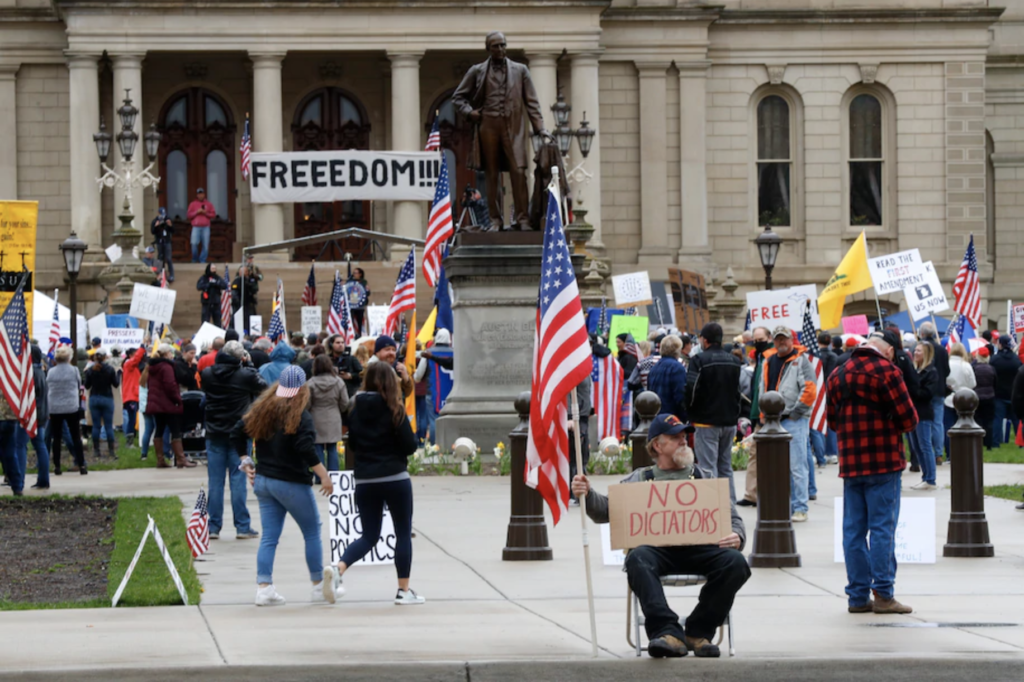In California, Michigan, Ohio, Pennsylvania and elsewhere, protesters have demanded a return to life as it was before the lockdown, insisting on going back to work and expressing contempt for social distancing practices, mask-wearing and other measures intended to stem the spread of the novel coronavirus.
Given that many of the protesters shun masks and social distancing in their lives, some will almost certainly fall ill with covid-19. John W. McDaniel, an Ohio man who on Facebook had criticized lockdown measures as a “political ploy,” died from the virus last month.
Would McDaniel or anyone else who opposed the lockdown and was infected with the virus — putting their families, their community and their caregivers at risk of getting ill and dying — be refused care? Certainly not. When I was a resident physician, my colleagues and I would occasionally treat prisoners in the hospital emergency room. We were told never to ask their guards about the prisoners’ crimes. Frankly, we didn’t want to know. Was this person a murderer? A rapist? Or maybe just someone who grew up in tough circumstances, got stuck with a bad crowd and was in the wrong place at the wrong time? Patients are patients. We treat them. Better not to know.
Those of us in health care find the anti-lockdown protesters’ behavior abhorrent. We are terrified of this virus, we thank our co-workers and colleagues around the world every day, and wish more than anyone else that covid-19 would be gone. Like everyone else, we want to get back to our lives. But we also see that social distancing is working. The case numbers have started to drop in cities and states where it is being utilized. We worry that as soon as restrictions are lifted — and especially if it isn’t done gradually — a second wave of infection will surge. We are as fearful as we are hopeful.
Americans are fortunate to live in a country with constitutional, spelled-out rights that are hard-won and sometimes fought over. But with those rights come responsibilities, primarily civic ones. Like it or not, belonging to a community, no matter how small, means bearing the responsibility to immunize our children and ourselves. Vaccinations protect everyone, our herd. But there will always be anti-vaccination protests — they have been around since soon after the British physician Edward Jenner introduced the smallpox vaccine in the late 1700s, and they will endure long after social media platforms are replaced by something even more effective at spreading misinformation. Still, the story of vaccines is one of civic responsibility triumphing over a noisy minority of the civically irresponsible.
Doctors’ civic responsibilities are buttressed by moral responsibilities and by the oaths they take upon graduation from medical school. These include vows to do no harm and to care for all, irrespective of the doctors’ “feelings.” Yes, there are many pediatricians who will not treat children in their practice if the parents do not follow the vaccination program recommended by public health officials, but these physicians will help the family find a doctor who will.
If and when there is a vaccine against covid-19, there will be some who refuse vaccination for themselves and their families. That’s as predictable as the next sunrise. But such a refusal won’t prompt physicians to deny treatment to them if they become ill with the virus. Will the schools allow students to attend classes if they have not been immunized against this killer? The answer: They probably will, because education is the schools’ civic responsibility.
In the medical social media circles lately, some participants have suggested that the anti-lockdown protesters sign waivers promising to forego treatment if they get sick with the virus, and declining resuscitation with a precious ventilator. But we know in our hearts that we will treat them like any other patient. There are no VIPs when it comes to covid-19. There are also no criminals.






